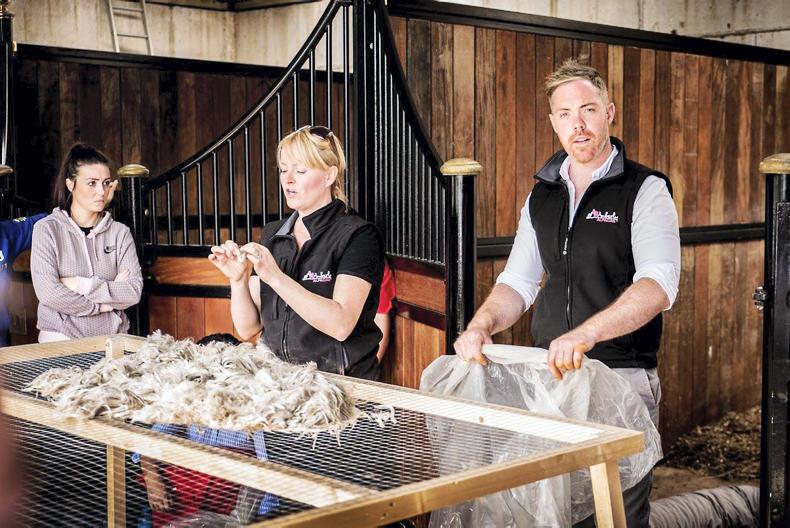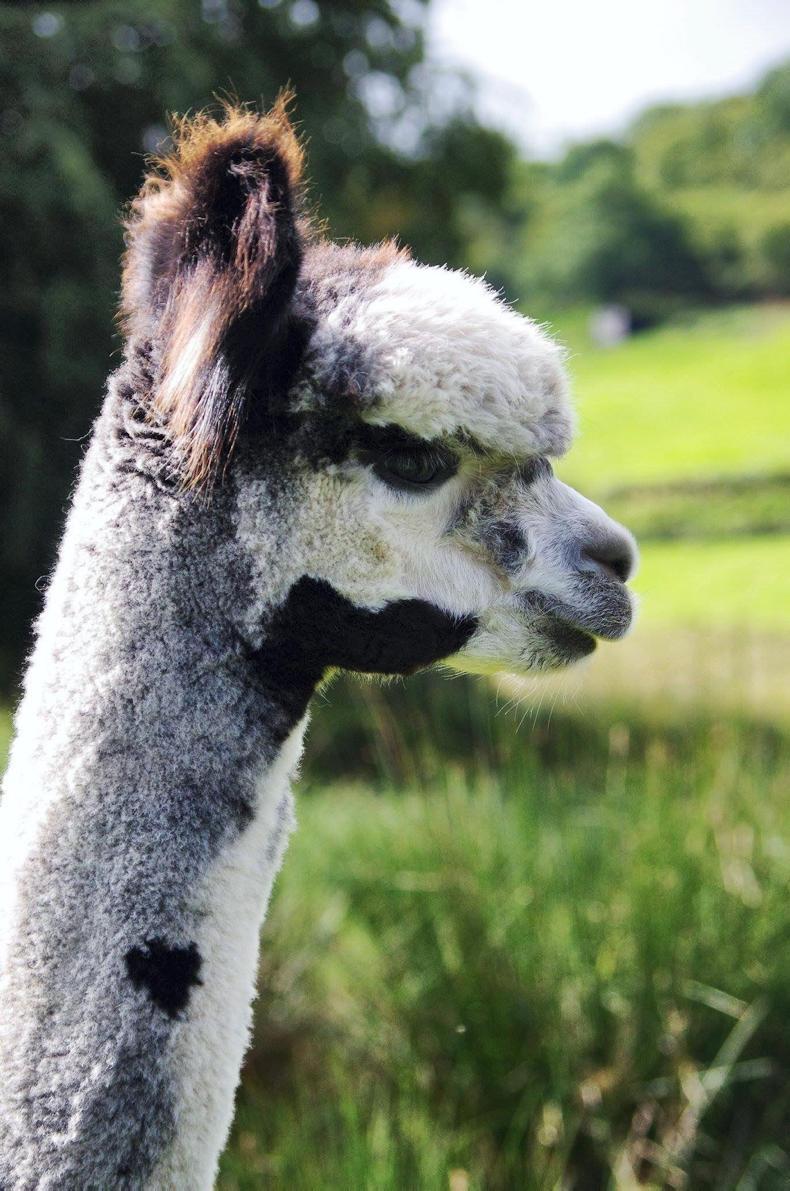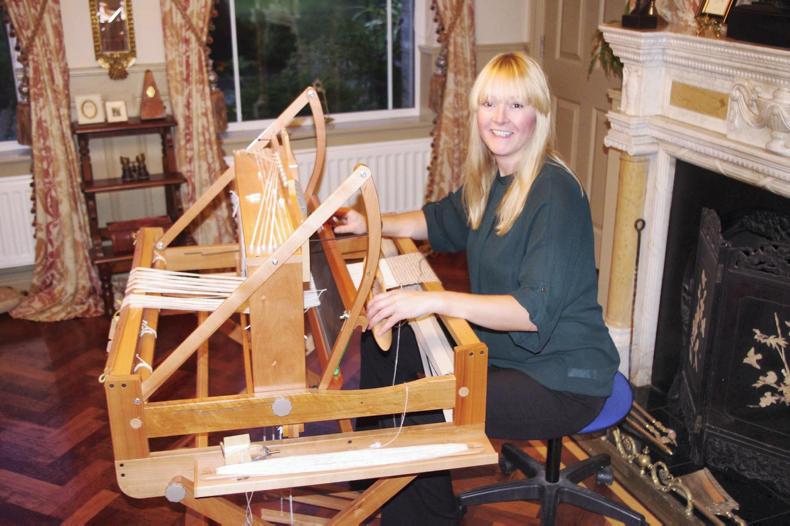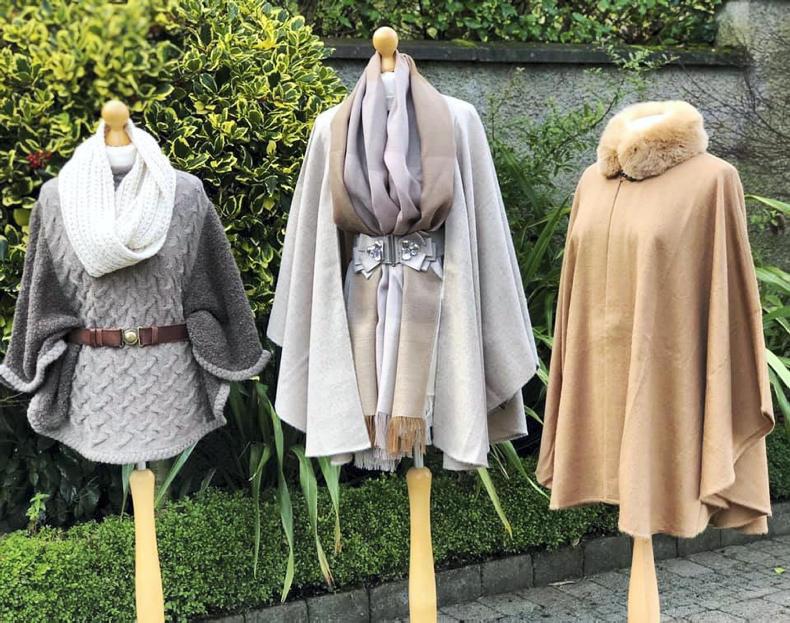Between full-time jobs and managing a herd of alpacas, there is no down time for local primary school headmaster Roger and chiropractor Elaine Clarke.
The pair – who married in 2006 – have built up a reputation for breeding as Amberly Alpacas.

Roger and Elaine Clarke with their award-winning Suri alpaca.
Situated close to Clogher in Co Tyrone, their most recent success saw them claiming the top prize at the British Alpaca National with Popham Gabine; and they are the first Irish people to do so. Alpaca farming in Northern Ireland has grown in popularity over the years; Roger (who is a qualified alpaca show judge) and Elaine, hope to keep the interest increasing. Breeding and showing alpacas was something that happened naturally for them or, in Roger’s words, “it’s a hobby gone mad”.
“We were in the same class at primary school and grew up together. When we got married, we moved into this house and we had a bit of land, approximately two acres. We always liked something a bit different and we became friendly with a lady who had five alpacas. She’s retired now, but we had to really prove ourselves to her and she let us have three.

Roger and Elaine Clarke of Amberly Alpacas during one of their alpaca education days.
“They gave us our foundation and then we went further afield, including the UK, to source animals. We’re interested in different aspects, so we work perfectly as a team.
“We currently have 56, the figure fluctuates. Now numbers are at their lowest because last year’s babies have been weaned and some sold. The numbers will increase with new babies this summer. Alpacas are on average pregnant for 11 and a half months.
Breeding
“We concentrate on breeding for quality. They’re usually sold to people who want to start a herd or to existing breeders. We’ve sold into the Netherlands and Sweden, and we’ve done exports with people wanting to get the genetics that we have. They could end up anywhere and there is nothing as nice as helping someone to source or add something that you’ve bred to their herd.

“Our alpacas are friendly and well-socialised, there is something for everybody. You’ll have people who want pets and we can produce that for them, right through to someone who wants a show-quality animal. We’re investing in better-quality animals and it’s good for the industry as a whole because it’s raising the standards.
“We’re both qualified trainers in terms of delivering husbandry courses. We work with other breeders and with Northern Ireland and Republic of Ireland’s alpaca group to deliver training and various workshops, which we usually have here. We’ll run spinning and felting days and alpaca education-type days, all for the good of the industry in Ireland.
“We have seen a lot of changes in the industry, but it’s all positive. It’s gathering momentum and the interest is there.”
“The alpacas have increased to the point where most people would say, ‘We don’t have room any more,’ but we just bought more land. It has taken over, but we love it.

Elaine Clarke of Amberly Alpacas creating a product using alpaca yarn.
"There are two types of alpaca. Huacaya are the fluffy, teddy bear-type ones and there is a long-haired version called Suri. We were the first to bring Suris into Ireland five years ago.
“Suris are the rarer of the two. They have the silkiest, lustrous locking system, it’s just fabulous.”
Fleeces
“Roger likes the genetics and the show scene. That lends to wanting better animals, so I get the by-product of that, which is the fleece and I’m able to produce really scrummy yarn. We’ll prepare fleeces for shows, sometimes we send fleeces to England.
“It comes straight off the alpaca. We’ll noodle the fleece so that whenever we unroll it, it’s perfect coming off the animal.

Amberly Alpacas' 100% baby alpaca poncho (£165), 100% alpaca ruana wrap (£185) and 100% alpaca cape with detachable collar (£225).
"That allows us to skirt it better. Skirting is preparing it for the mill or a show, so it’s taking off the vegetable matter such as dirt and brambles.
“We send it off to the mill, it comes back as yarn and then we make the products. It’s weighted differently. You could have a fine yarn, which is lace weight, right up to chunky. Every year I try something different and see what people want to buy, including the colours. This year I’m trying chunky and I’m mixing colours together to see what’ll come out.
“I have a couple of very loyal buyers who would buy bulk on the cones because they want home-grown, Irish alpaca yarn. It’s sustainable yarn, but you do have to pay a little bit more for it.”
Flock guards

“Some alpacas are better flock guards than others, but they’re very inquisitive, so on the most part if they see something coming into their territory, they’ll go to it to find out what it is and that’s why it works with foxes most of the time.
“We know the alpacas individually, so we can sell to the buyer’s needs. If they want something that is friendly for children, we know what we’ve got; or if they want something that’s a bit more proud and is good at looking after sheep or hens, we know what’s appropriate, but in general we don’t have the stock to sell as flock guards, it’s not really our market.
“We can give support to the people who buy from us, so if someone says that one of the alpacas is less boisterous than they normally are, we can say, ‘Well that’s not quite normal, you need to keep a wee eye on him or her.’ Or if you bought a pregnant female and phone saying ‘Snowball is sitting about more, do you think that she’s okay?’, we’ll say ‘100%, she is six months pregnant, and she’ll huff and puff until she gives birth’.” CL
Visit Amberly Alpacas on Facebook.
Read more
My Country Living: A real life fairy-tale
My Country Living: 'I hated running; now I'm working towards my 400th marathon'
Between full-time jobs and managing a herd of alpacas, there is no down time for local primary school headmaster Roger and chiropractor Elaine Clarke.
The pair – who married in 2006 – have built up a reputation for breeding as Amberly Alpacas.

Roger and Elaine Clarke with their award-winning Suri alpaca.
Situated close to Clogher in Co Tyrone, their most recent success saw them claiming the top prize at the British Alpaca National with Popham Gabine; and they are the first Irish people to do so. Alpaca farming in Northern Ireland has grown in popularity over the years; Roger (who is a qualified alpaca show judge) and Elaine, hope to keep the interest increasing. Breeding and showing alpacas was something that happened naturally for them or, in Roger’s words, “it’s a hobby gone mad”.
“We were in the same class at primary school and grew up together. When we got married, we moved into this house and we had a bit of land, approximately two acres. We always liked something a bit different and we became friendly with a lady who had five alpacas. She’s retired now, but we had to really prove ourselves to her and she let us have three.

Roger and Elaine Clarke of Amberly Alpacas during one of their alpaca education days.
“They gave us our foundation and then we went further afield, including the UK, to source animals. We’re interested in different aspects, so we work perfectly as a team.
“We currently have 56, the figure fluctuates. Now numbers are at their lowest because last year’s babies have been weaned and some sold. The numbers will increase with new babies this summer. Alpacas are on average pregnant for 11 and a half months.
Breeding
“We concentrate on breeding for quality. They’re usually sold to people who want to start a herd or to existing breeders. We’ve sold into the Netherlands and Sweden, and we’ve done exports with people wanting to get the genetics that we have. They could end up anywhere and there is nothing as nice as helping someone to source or add something that you’ve bred to their herd.

“Our alpacas are friendly and well-socialised, there is something for everybody. You’ll have people who want pets and we can produce that for them, right through to someone who wants a show-quality animal. We’re investing in better-quality animals and it’s good for the industry as a whole because it’s raising the standards.
“We’re both qualified trainers in terms of delivering husbandry courses. We work with other breeders and with Northern Ireland and Republic of Ireland’s alpaca group to deliver training and various workshops, which we usually have here. We’ll run spinning and felting days and alpaca education-type days, all for the good of the industry in Ireland.
“We have seen a lot of changes in the industry, but it’s all positive. It’s gathering momentum and the interest is there.”
“The alpacas have increased to the point where most people would say, ‘We don’t have room any more,’ but we just bought more land. It has taken over, but we love it.

Elaine Clarke of Amberly Alpacas creating a product using alpaca yarn.
"There are two types of alpaca. Huacaya are the fluffy, teddy bear-type ones and there is a long-haired version called Suri. We were the first to bring Suris into Ireland five years ago.
“Suris are the rarer of the two. They have the silkiest, lustrous locking system, it’s just fabulous.”
Fleeces
“Roger likes the genetics and the show scene. That lends to wanting better animals, so I get the by-product of that, which is the fleece and I’m able to produce really scrummy yarn. We’ll prepare fleeces for shows, sometimes we send fleeces to England.
“It comes straight off the alpaca. We’ll noodle the fleece so that whenever we unroll it, it’s perfect coming off the animal.

Amberly Alpacas' 100% baby alpaca poncho (£165), 100% alpaca ruana wrap (£185) and 100% alpaca cape with detachable collar (£225).
"That allows us to skirt it better. Skirting is preparing it for the mill or a show, so it’s taking off the vegetable matter such as dirt and brambles.
“We send it off to the mill, it comes back as yarn and then we make the products. It’s weighted differently. You could have a fine yarn, which is lace weight, right up to chunky. Every year I try something different and see what people want to buy, including the colours. This year I’m trying chunky and I’m mixing colours together to see what’ll come out.
“I have a couple of very loyal buyers who would buy bulk on the cones because they want home-grown, Irish alpaca yarn. It’s sustainable yarn, but you do have to pay a little bit more for it.”
Flock guards

“Some alpacas are better flock guards than others, but they’re very inquisitive, so on the most part if they see something coming into their territory, they’ll go to it to find out what it is and that’s why it works with foxes most of the time.
“We know the alpacas individually, so we can sell to the buyer’s needs. If they want something that is friendly for children, we know what we’ve got; or if they want something that’s a bit more proud and is good at looking after sheep or hens, we know what’s appropriate, but in general we don’t have the stock to sell as flock guards, it’s not really our market.
“We can give support to the people who buy from us, so if someone says that one of the alpacas is less boisterous than they normally are, we can say, ‘Well that’s not quite normal, you need to keep a wee eye on him or her.’ Or if you bought a pregnant female and phone saying ‘Snowball is sitting about more, do you think that she’s okay?’, we’ll say ‘100%, she is six months pregnant, and she’ll huff and puff until she gives birth’.” CL
Visit Amberly Alpacas on Facebook.
Read more
My Country Living: A real life fairy-tale
My Country Living: 'I hated running; now I'm working towards my 400th marathon'











SHARING OPTIONS